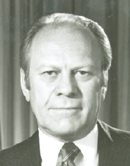
Return to U.S. Presidency - Index Page.
Return to U.S. Presidents' Biographies Page.
Born: 7/14/1913
Birthplace: Omaha, Neb.
Gerald Rudolph Ford was born Leslie King Jr. in Omaha, Neb., on July 14, 1913, the only child of Leslie and Dorothy Gardner King. His parents were divorced in 1915. His mother moved to Grand Rapids, Mich., and married Gerald R. Ford. The boy was renamed for his stepfather.
Ford captained his high school football team in Grand Rapids, and a football scholarship took him to the University of Michigan, where he starred as varsity center before his graduation in 1935. A job as assistant football coach at Yale gave him an opportunity to attend Yale Law School, from which he graduated in the top third of his class in 1941.
He returned to Grand Rapids to practice law, but entered the Navy in April 1942. He saw wartime service in the Pacific on the light aircraft carrier Monterey and was a lieutenant commander when he returned to Grand Rapids early in 1946 to resume law practice and dabble in politics.
Ford was elected to Congress in 1948 for the first of his 13 terms in the House. He was soon assigned to the influential Appropriations Committee and rose to become the ranking Republican on the subcommittee on Defense Department appropriations.
As a legislator, Ford described himself as “a moderate on domestic issues, a conservative in fiscal affairs, and a dyed-in-the-wool internationalist.” He carried the ball for Pentagon appropriations, was a hawk on the war in Vietnam, and kept a low profile on civil-rights issues.
Ford was also dependable and hard-working and popular with his colleagues. In 1963, he was elected chairman of the House Republican Conference. He served in 1963-1964 as a member of the Warren Commission, which investigated the assassination of John F. Kennedy. A revolt by dissatisfied younger Republicans in 1965 made him minority leader.
Ford shelved his hopes for the speakership on Oct. 12, 1973, when Nixon nominated him to fill the vice presidency left vacant by Agnew's resignation under fire. It was the first use of the procedures for filling vacancies in the vice presidency laid down in the 25th Amendment to the Constitution, which Ford had helped enact.
Congress confirmed Ford as vice president on Dec. 6, 1973. Once in office, he said he did not believe Nixon had been involved in the Watergate scandals, but criticized his stubborn court battle against releasing tape recordings of Watergate-related conversations for use as evidence.
The scandals led to Nixon's unprecedented resignation on Aug. 9, 1974, and Ford was sworn in immediately as the 38th president, the first to enter the White House without winning a national election.
Ford assured the nation when he took office that “our long national nightmare is over” and pledged “openness and candor” in all his actions. He won a warm response from the Democratic 93rd Congress when he said he wanted “a good marriage” rather than a honeymoon with his former colleagues. In December 1974 Congressional majorities backed his choice of former New York Gov. Nelson A. Rockefeller as his successor in the again-vacant vice presidency.
The cordiality was chilled by Ford's announcement on Sept. 8, 1974, that he had granted an unconditional pardon to Nixon for any crimes he might have committed as president. Although no formal charges were pending, Ford said he feared “ugly passions” would be aroused if Nixon were brought to trial. The pardon was widely criticized.
To fight inflation, the new president first proposed fiscal restraints and spending curbs and a 5% tax surcharge that got nowhere in the Senate and House. Congress again rebuffed Ford in the spring of 1975 when he appealed for emergency military aid to help the governments of South Vietnam and Cambodia resist massive Communist offensives.
In November 1974, Ford visited Japan, South Korea, and the Soviet Union, where he and Soviet leader Leonid I. Brezhnev conferred in Vladivostok and reached a tentative agreement to limit the number of strategic offensive nuclear weapons. It was Ford's first meeting as president with Brezhnev, who planned a return visit to Washington in the fall of 1975.
Politically, Ford's fortunes improved steadily in the first half of 1975. Badly divided Democrats in Congress were unable to muster votes to override his vetoes of spending bills that exceeded his budget. He faced some right-wing opposition in his own party, but moved to pre-empt it with an early announcement—on July 8, 1975—of his intention to be a candidate in 1976.
Early state primaries in 1976 suggested an easy victory for Ford despite Ronald Reagan's bitter attacks on administration foreign policy and defense programs. But later Reagan primary successes threatened the President's lead. At the Kansas City convention, Ford was nominated by the narrow margin of 1,187 to 1,070. But Reagan had moved the party to the right, and Ford himself was regarded as a caretaker president lacking in strength and vision. He was defeated in November by Jimmy Carter.
In 1948, Ford married Elizabeth Anne (Betty) Bloomer. They had four children, Michael Gerald, John Gardner, Steven Meigs, and Susan Elizabeth.
Died: 12/26/2006





